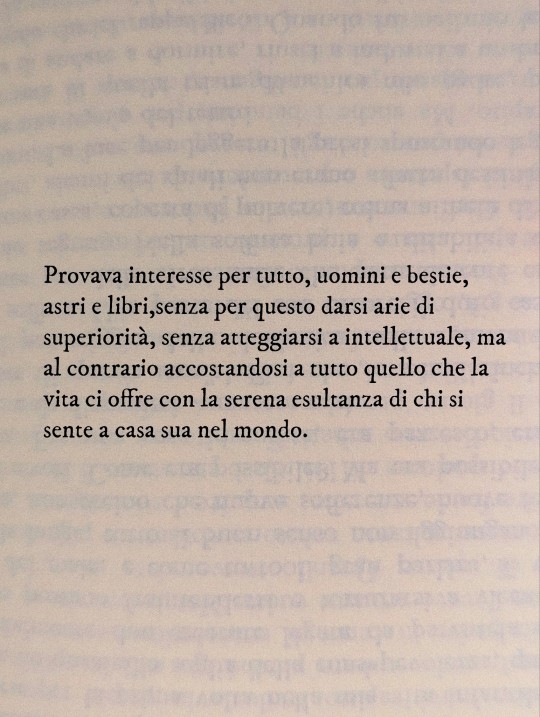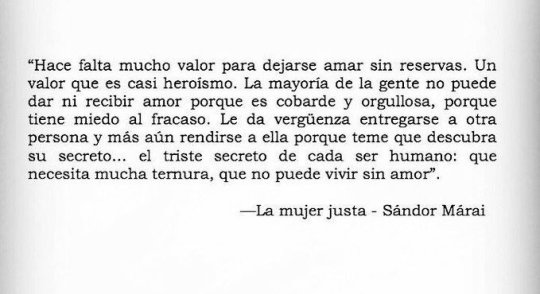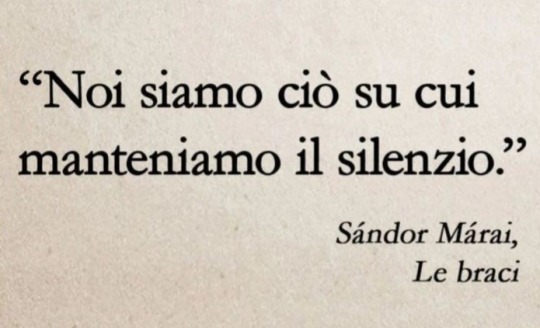#sándor márai
Text
"Secondo te le parole non hanno importanza? Io non oserei affermarlo con tanta sicurezza. Certe volte mi sembra che le parole, quelle che uno pronuncia, quelle che evita di dire, o quelle che scrive al momento giusto, abbiano un'importanza grandissima, forse addirittura decisiva…"
— Sándor Márai - Le braci
#parole#importanza#affermare#sicurezza#pronunciare#evitare#scrivere#momento giusto#decisivo#frasi#frasi tumblr#frasi e citazioni#sándor márai
139 notes
·
View notes
Text
Il tempo consuma ogni cosa dentro di noi e brucia tutte le menzogne. Ciò che rimane è la realtà.
Sándor Márai, da "L'eredità di Eszter"
33 notes
·
View notes
Text
Esistono soltanto due farmaci divini che possono aiutarci a sopportare il veleno della realtà senza che ne moriamo anzitempo: la ragione e l’indifferenza.
Sándor Márai
35 notes
·
View notes
Text

L'amore, quello vero, è paziente, mia cara.
L'amore è infinito e sa attendere.
30 notes
·
View notes
Text

Le braci, Sándor Márai
#sándor márai#citazioni letterarie#librisulibri#frasi belle#frasi letteratura#citazioni libri#citazioni#letteratura#romanzi#narrativa#narrativa contemporanea
58 notes
·
View notes
Text
...čovjek nikada ne govori o tome što ga boli, nego to bez riječi podnosi.
#lifeinbooks#kad svijeće dogore#sándor márai#a gyeryák csonkig égnek#citati#knjiga#citati iz knjige#books#booklover#book qoute#balkan
13 notes
·
View notes
Text
Arról, hogy a szívek összetörnek
De pontosan úgy, mint a dalokban, melyeket a kávéházi chansonénekesnők énekelnek. S a dalok tanulsága mindig annyi, hogy az összetört szíveket nem lehet többé eggyéragasztani. Az életben is ennyi a tanulság. Ha egy ember egyszer bizalommal, föltétlen érzésekkel közeledett valakihez, s érzéseit megsértették, “szívét összetörték”, soha többé nem tud igazi bizalmat, feltétlen odaadást érezni egy másik ember iránt. Nincs érzékenyebb anyag a földön, mint az emberi anyag. Képtelen arra, hogy elfeledjen egy sértést, mellyel lelkét vagy érzéseit illették. S bármiféle baráti vagy szerelmi találkozást hoz is még számára az élet, gyanakvó marad, minden kapcsolat torz és gonosz játékalkalom lesz számára, örökké bosszút akar. Ilyen az ember. Vigyázz, ha ilyen megsértett szívűekkel állasz szemközt: nem tudod őket megengesztelni. S nincs az a türelem, bölcsesség, nagylelkűség, szenvedély, mely az ilyen csalódott szíveket nyugtatni tudja.
23 notes
·
View notes
Note
Portraits of a Marriage was good, thanks for the rec! follow ups:
1. I fear I was not able to "get" all of it properly (especially the ending bits) because I have no grasp on Hungarian history whatsoever. Is there a book or article that you'd recommend for me to read on Hungary during/just after WWII for me to read before rereading Portraits?
2. Why do you think that Márai never named the writer character? At first, I suspected that perhaps the writer character was related to Márai himself in some way, but then the character forswore writing and I was like...well, Márai definitely didn't do that, as evidenced by the book existing, so ???
--interlude for random additional Portraits thoughts--
And this one's more of an observation, not a question, but. Each narrator added so much and sucked me into their perspective so strongly that I sometimes had to consciously step back from them because I caught myself thinking in the way that they did. For example, the drummer at the end had me thinking, gee, what is that culture that the writer and the second wife spoke of as a "reflex" and why is it so cool/the thing that the drummer feels is missing from his life? And only after a bit did I remember that from the husband's perspective, the (bougie? idk how to spell it sorry) culture was a strictly self-enforced and absolutely horrifying affair, not at all reflexive or natural, and prison-like. That he was dreadfully unhappy inside it. And even when the second wife mastered that upper class culture to the extent that she could, it did not make her happy either.
Wild! Wild times!
It's so like Parade's End on the surface, cause you've got the multiple POVs on a strained upper class marriage, downfalls caused by war, the class upheaval caused by war, lots of musings on culture/art and its meaning or lack of meaning...and then like. idk they're so different asjklsfdj;afsfdjs they just are. I don't anticipate ever becoming weirdly close to/fond of these characters the way I did the Parade's End ones
--end--
3. Do you have any recs of more novels that feature messed up marriages (or healthy marriages under strain) in which both characters get to be a POV character at some point?
thank you! 💛
Prologomenon: YESSSSSS.
My knowledge of 20th-century history is patchy, so I'm afraid I'm only going to have two recent historian-writing-for-trade-market books to recommend, because they both have further reading in the back and offer good brief intros: Goodbye, Eastern Europe, by Jacob Mikanowski (so good I'm still a little mad about it) and The Middle Kingdoms, by Martyn Rady (I'm still in the premodern chapters but it is one of those sweeping ancient-to-present histories, erudite and readable.)
Mmm, I view it as a deliberate ambiguity: the creation of a character who is and is not, or might or might not be, identified with the author. I think it matters that this is after Dr. Zhivago.
Interlude: Yes yes yes!! I'm so glad that you enjoyed this stylistic decision about how to represent the characters and how they are trapped and trying not to be.
3. Book recs! Forewarning that the degree to which these fulfill the requirement may vary a bit, partly because my memory of how POV works in some of them may be hazy.
The Unbearable Lightness of Being, Milan Kundera. Omniscient narrator rotates among multiple partners and it is so so so so so good. Most clearly conforms to rec request!
Embers, Sandor Marai. I don't remember the POV details here but knowing that you enjoyed Portraits of a Marriage so much, I recommend it heartily!
Love in the Time of Cholera, Gabriel Garcia Marquez. Classic for a reason. Lots of incredibly vivid vignettes.
Dr. Zhivago, Boris Pasternak. Belated thought: you have read Dr. Zhivago, yes?? yes??
Anna Karenina, Leo Tolstoy. Similarly: !!!! Omniscient narrator instead of first-person, but we still see inside Karenin's head and Anna's (and Vronsky's and Levin's and Kitty's and Stiva's (STIVA get your act together) and Dolly's and... I love them. Well, except Vronsky, tbh. But still.
[This got... so long. More under the cut.]
Written on the Body, Jeanette Winterson. Only one narrator but... thematically relevant/interesting, with unnamed narrator.
The English Patient, Michael Ondaatje. *incoherent sobbing* I would argue that this does meet the requirement but in ways that are... complicated.
The Children's Book, A.S. Byatt. *faint keening* The marriage is healthy but there are so many strains and I have so many feelings.
On the Edge of Reason, Miroslav Krleža. I am 94% sure that this novel involves infidelity as well as marital strain. Only one first-person narrator. Savage humor. Political turmoil. Also fascism and Stalinism because, well, it's Croatia in the 1930s.
Incidental Music, Lydia Perović. Three different POVs, infidelity, and I am fairly sure that both parties in one of the affairs get a narrator section.
The French Lieutenant's Woman, John Fowles. Thematically correct, I feel, but I would need to reread it (I really should reread it) to figure out how close it gets to your request.
Birdsong, Sebastian Faulks. Definitely has marriage with infidelity and multiple POVs. I may or may not remember the full list of POV characters who get 3rd-person limited.
Le Hussard sur le Toit, Jean Giono. I suddenly remembered this book and how much I love its prose, and I do not remember things about POV in a useful way.
La Reine Margot, Alexandre Dumas. Absolutely unhinged polyamorous situations, omniscient 19th-century narrator. This book is so weird and I love it so much.
Effi Briest, Theodor Fontane. This book is so good and so atmospheric and so unsettling and I know we get inside multiple people's heads in it, including those of both Effi and her husband.
Unsterblich sind nur die anderen, Simone Buchholz. I just finished this over the weekend and I have a lot of feelings about it. Is it a marriage if one of the parties is... a lot of sea goddesses? This is not a serious spoiler.
...apparently I have read a whole lot of thematically relevant fiction. Huh. I hope you enjoy! :)
11 notes
·
View notes
Text
Commettiamo sempre peccato quando non ci accontentiamo di quello che il mondo ci offre spontaneamente, di ciò che una persona ci dà per libera scelta, è sempre peccato tendere rapidamente la mano per carpire il segreto di un altro. Perché non cerca di vivere più modestamente, senza tutte queste pretese affettive?… L'amore, quello vero, è paziente, mia cara figliola. L'amore è infinito e sa attendere.
Sándor Márai, da La donna giusta
19 notes
·
View notes
Text
El amor está en peligro de extinción

#quotes#pienso en versos#frases#citas#citas de libros#la mujer justa#sándor márai#corazón#amar#vergüenza#valentía#atreverse#amor#extinción
39 notes
·
View notes
Quote
To hope is to fear what you desire, the things in which you neither trust nor genuinely believe. You don't place your hopes in what you already have: what is possessed simply exists, as if by default.
— Portraits of a Marriage (Sándor Márai), translated by George Szirtes
#book quotes#historical fiction#romance fiction#psychological fiction#sándor márai#george szirtes#portraits of a marriage#psychology#hope#fear#desire#trust#distrust#belief
6 notes
·
View notes
Text

"Az emberek agyafúrt aljassága, mérnökien kitervelt becstelensége idővel már nem dühít, inkább elszórakoztat, néha elkápráztat. Úgy látszik, ez az igazi emberi műfaj, ebben igazán nagy, emberi az ember: az aljasságban és a becstelenségben."
Márai Sándor
#sándor márai#Márai#fideszbűnözés#nertelenítést#ormány röfi#szekularizáció#pitypang#déli#déli pu#pályaudvar#alkotás uTHCa
3 notes
·
View notes
Text
Quando qualcuno riemerge dal passato per annunciare con voce commossa di voler mettere a posto ogni cosa, si può soltanto compiangerlo, o sorridere alle sue intenzioni; il tempo ha già messo a posto tutto, a modo suo, nell’unico modo possibile.
Sándor Márai, da "L'eredità di Eszter", 1939
101 notes
·
View notes
Text
La vita trascorre nell'oscurità: parole non dette, gesti tralasciati in tempo, silenzio e paura, ecco che cos'è la vita, quella vera.
16 notes
·
View notes
Photo

Non è vero che il destino si introduce alla cieca nella nostra vita. Esso entra dalla porta che noi stessi gli abbiamo spalancato, facendoci da parte per invitarlo ad entrare.
20 notes
·
View notes
